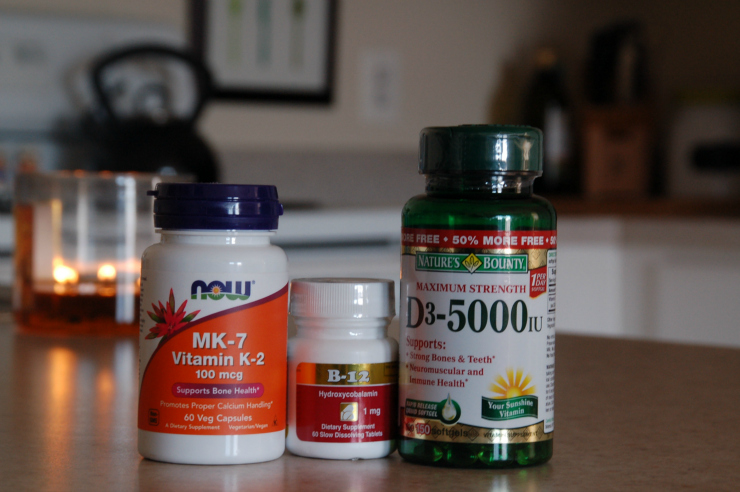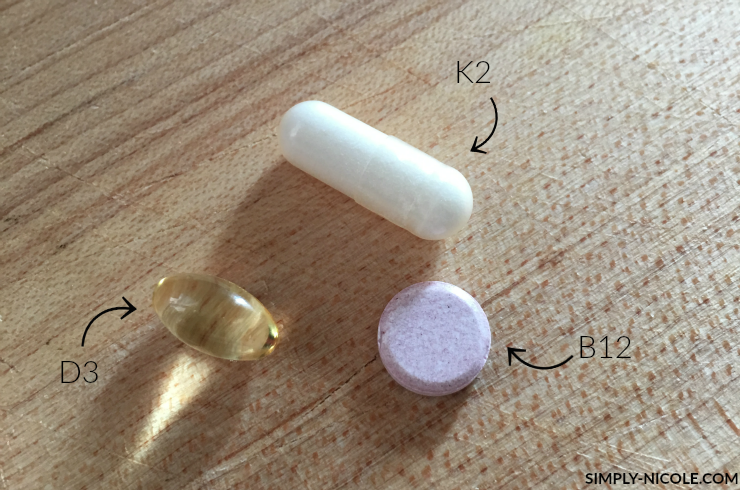Like the rest of the world, one of my resolutions for 2016 is to take better care of myself – get back into yoga, go for walks, drink more water (always a struggle!), get more sleep, and most importantly take my vitamins. Last spring I switched my general practitioner to a holistic doctor. She has a special interest in nutrition, preventative medicine and women’s health with an emphasis on healthy lifestyle patient education. Right up my alley!
She had me get a bunch of blood work done and my results showed that I was deficient in vitamins B12, D and K. She told me to start taking a bunch of supplements to get my levels back up to a reasonable amount.
B12
The most important vitamin I’m taking is B12. My blood test results showed that I am extremely deficient in the vitamin. Deficiency is most commonly cause by low intakes, but can also occur from malabsorption. B12 is found in fish, meat, poultry, eggs, milk and milk products. Although I eat a large amount of fish and eggs, I still have low levels of B12. B12 is important for many important functions including the maintenance of the cardiovascular and nervous systems. Symptoms of deficiency include fatigue, digestive problems, nausea, nerve pain, mental health disorders, infertility and anemia.
To help increase and stabilize my B12 levels, my doctor recommended that I take 1000mcg/1mg daily of the hydroxocobalamin form. In the beginning, she recommended that I cut the pills in quarters, and eventually work up to the full dose. Below are the three forms of B12 supplements:
Cyanocobalamin is the synthetic version of B12 and does not occur in plants or animal tissue. It’s created in a lab, which makes it the cheapest supplement option and the most widely produced. Cyanocobalamin requires a higher dosage for the same effectiveness of hydroxycobalamin, another form of B12.
Methylcobalamin is the most active form of B12 in the body. It absorbs better and is used better in your brain, liver and nervous system. It also helps eliminate toxic substances in the body through a process called methylation. It converts homocysteine into methionine, which helps protect the cardiovascular system. Although I would prefer to take this form of B12 supplements, I had a negative reaction to it in the past.
Hydroxocobalamin is created naturally by bacteria, making it the main type of B12 found in most foods. It converts easily to methylcobalamin without introducing additional methyl groups which makes it great for people like me who are sensitive to methylated B vitamins.
D3 and K2
The next group of vitamins my doctor recommended that I take was D3 and K2. It’s estimated that 85 percent of Americans have insufficient levels of vitamin D. Known as the sunshine vitamin, vitamin D is produced by the body in response to exposure to sunlight. You can also get vitamin D in some fish, egg yolk and in fortified dairy and grain products. Vitamin D is important for strong bones, because it helps the body use calcium. Research suggests that the vitamin could also play a role in preventing and treating diabetes, hypertension and glucose intolerance. Since my levels were low and I don’t drink too much cows milk, my doctor recommended that I get a supplement.
However, when you take a vitamin D supplement, it’s also recommended that you take vitamin K2. Because while vitamin D assists in calcium absorption, it is vitamin K that guides the calcium to bones and prevents the absorption into organs and arteries.
Talk To Me:
- What vitamins do you take every day?
- Have you had negative reactions to a specific vitamin?
- Where do you buy your vitamins?
Thank you for reading my post today.
Don’t forget to follow me on Facebook, Instagram, Twitter and Pinterest.
I am not a medical professional. Please see a doctor and do your own research before purchasing and taking vitamins.




This is such an important topic that I feel really goes unaddressed in a lot of people’s lives. I think so many people are taking the wrong doses and types of vitamins, but they do not know any better! I believe this topic should be covered by everyone’s primary care doctor. Do you feel a difference now that you have vitamins tailored to your specific needs?
Thanks Alex. I completely believe that vitamin dosage should be addressed by everyone’s primary care doctor 🙂